The French Connection Blu-ray Movie
HomeThe French Connection Blu-ray Movie 
Filmmakers Signature Series | Remastered20th Century Fox | 1971 | 104 min | Rated R | Mar 18, 2012
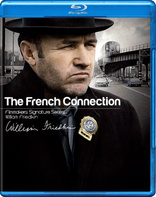
Movie rating
8.1 | / 10 |
Blu-ray rating
| Users | 4.3 | |
| Reviewer | 4.0 | |
| Overall | 4.0 |
Overview
The French Connection (1971)
Tough-talking New York City detective Popeye Doyle and his partner uncover an international drug smuggling ring, but it's Doyle's feverish and relentless pursuit of the suspects that drives the investigation forward.
Starring: Gene Hackman, Fernando Rey, Roy Scheider, Tony Lo Bianco, Marcel BozzuffiDirector: William Friedkin
| Drama | 100% |
| Crime | 38% |
| Action | Insignificant |
| Thriller | Insignificant |
Specifications
Video
Video codec: MPEG-4 AVC
Video resolution: 1080p
Aspect ratio: 1.85:1
Original aspect ratio: 1.85:1
Audio
English: DTS-HD Master Audio 5.1 (48kHz, 24-bit)
English: Dolby Digital 2.0 (224 kbps)
English: Dolby Digital 2.0 Mono (Original) (224 kbps)
Spanish: Dolby Digital 5.1 (448 kbps)
French: Dolby Digital 5.1 (448 kbps)
Russian: Dolby Digital 5.1
Music: Dolby Digital 5.1
All 5.1 are 448 kbps, English 2.0=Stereo Surruond
Subtitles
English SDH, Spanish, Mandarin (Simplified), Russian
Discs
50GB Blu-ray Disc
Single disc (1 BD)
Bonus View (PiP)
Packaging
Slipcover in original pressing
Playback
Region free
Review
Rating summary
| Movie | 5.0 | |
| Video | 4.0 | |
| Audio | 3.0 | |
| Extras | 3.5 | |
| Overall | 4.0 |
The French Connection Blu-ray Movie Review
Director "approved" -- again.
Reviewed by Martin Liebman March 8, 2012Never trust anyone.
History seems to show that every decade enjoys a style or genre that dominates its ten-year
span.
2010 was the decade of the Superhero film; the 1980s enjoyed a slew of larger-than-life Action
pictures; and the 1970s featured a plethora of gritty, grimy Police Dramas, perhaps none of them
more revered than 1971's The French Connection. They just don't make movies like
this
anymore, and it's a shame. Films like this require patience, dedication, and an eye for fine
detail to revel in all they have to offer, qualities that generally reflect the characters and plot
lines. The French Connection is a smart, deliberate, and slowly-paced
picture that takes its time in building a story and developing its characters, unlike so many of
today's blockbusters that feature thin plots, minimal characterization, and a plethora of effects
shots
to sell tickets. Perhaps it's a result of a modern, fast-paced world, or perhaps it's just that many
of
today's filmmakers are like kids playing with new toys on Christmas, but whatever the reason,
there
seems to be a disconnect between the thinking man's films of yore and the interchangeable,
dumbed-down pictures of today. The French Connection is 1970s filmmaking at its very
best, a showcase for cinema as art and encapsulating the dirty, harsh, and realistic themes that
era of moviemaking embraced.
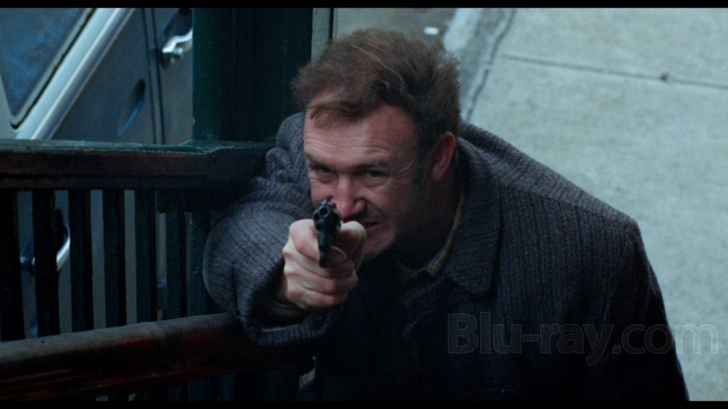
How do you like me now?
Jimmy "Popeye" Doyle (Gene Hackman, Hoosiers) and his partner, Buddy "Cloudy" Russo (Roy Scheider, Jaws) are a pair of New York City police officers hot on the trail of a large shipment of narcotics. Once they glean a bit of intelligence from one of their informants, they find themselves in pursuit of both the potential buyers -- Sal and Angie Boca and Joel Weinstock -- and the seller, Alain Charnier (Fernando Rey, That Obscure Object of Desire). Doyle's tactics may be of questionable morality, and his instincts on such matters are only occasionally right on, but he is given the go-ahead to further pursue his suspects. Eventually, Doyle and Charnier find themselves in a low-tech battle of wits as the suspected narcotics dealer eludes his pursuer at every turn -- and ultimately decides to employ more aggressive tactics against the dedicated officer. Will Doyle and Russo foil the deal, or will Charnier succeed in getting his shipment onto New York City streets?
The French Connection succeeds on multiple levels thanks to the creative talent on both sides of the camera. Few movie franchises, if one may call only a pair of films a "franchise," enjoy the contributions of two first-class directors: William Friedkin (The Exorcist) here and John Frankenheimer (Ronin) at the helm of French Connection II, not to mention a trio of highly gifted actors at the top of their games, Gene Hackman, Roy Scheider, and Fernando Rey. Friedkin's Oscar-winning direction -- and Owen Roizman's (3 Days of the Condor) Oscar-nominated cinematography -- do more for the feel of the picture than perhaps even the script. The film simply revels in its deliberateness, encapsulating the long, tedious work of the detectives therein portrayed and replicating their steadfastness and arduous undertakings by capturing the action with a gritty, nasty, bare-knuckles style that places the viewers on street-level with the characters. The film takes audiences to places that are usually either dangerous or filthy or both, showing the dark underbelly of society where only few dare tread. The French Connection allows its action pieces to come about naturally and logically, made a part of the story and not simply forced in to fill a quota. The film's action highlight comes in the form of a car chase sequence that is magnificent, leaving viewers breathless in its daring and excitement. Like so many other aspects of the movie, it feels real, which is what sells it. The car is driven with skill but not perfection; the sequence flows naturally and the various perils and obstacles do damage to the car and threaten the success of the chase. Often, there is doubt as to the outcome of the chase which allows for a greater sense of tension and excitement. Indeed, each of the film's action sequences, though not plentiful, feature a level of grit, danger, and realism that lend a tremendous amount of credibility to the experience.
Gene Hackman, one of cinema's most gifted actors of any generation, delivers what may be his career-defining performance and one of two to earn him an Oscar (the other coming for his work in Unforgiven). From a purely aesthetic perspective, his portrayal of "Popeye" Doyle may not best his uncanny performance as Lex Luthor in 1978's Superman, but the part easily represents one of the actor's finest moments. Hackman portrays Doyle as both unrelenting and ruthless, single-mined in his pursuit of cunning villains that leave him precious few avenues of pursuit. He's a cop that works on instinct as much as, if not more so than, hard evidence, a character trait and approach to his work that doesn't always sit well with others. The French Connection also features standout performances from Fernando Rey and Roy Scheider in a Best Supporting Actor Oscar-nominated performance. Rey's character is the quintessential villain, street smart and evasive, remaining a step ahead, focused on his goals, but never forgetting that he and his deal have come under intense scrutiny. Unlike so many other cinematic villains, Rey's Alain Charnier is absolutely no-nonsense in his approach; he is in business for business, not for side ventures or revenge against another character. He remains focused on his task, does only what he deems necessary to successfully make the deal, and no more. He's given no witty one-liners or extensive backstory; he's an intelligent criminal that finds his work hindered only by a zealous police detective. It is another of the film's strengths that it deals in what the audience may perceive as an extension of reality, featuring characters that are motivated only by their work rather than some external or other past event that truly drives their ambitions behind-the-scenes.
The French Connection Blu-ray Movie, Video Quality 
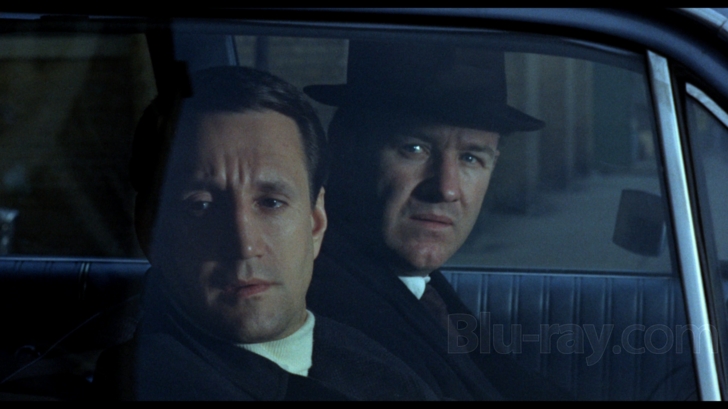
There are probably as many personal idiosyncrasies as there are Blu-ray viewers, idiosyncrasies which can be reflected in screen size, display style,
settings tweaks,
viewing environments, and a whole host of personalized likes and dislikes. But despite slight difference in personal preferences, most Blu-ray viewers
can probably be lumped under the general umbrella of one of two very
different fundamental camps: videophile purists who demand a picture as close to the original presentation as intended by the filmmakers prior
to the picture's theatrical (or, in a few rare cases, maybe, home video) premiere, and viewers who want the shiniest and most crisp HD material,
regardless of
whether "shiny" or
"crisp" reflect the filmmakers' original intent. Of course there's the ultra-casual viewers who don't care, or even know, about "DNR" and "grain" and
"filmmaker intent" to begin with, those who see no difference between DVD and Blu-ray because "you just shove the disc in the slot" (real quote),
though from personal experience, anyway, these people usually seem to fall into the "shiny" and "crisp" grouping.
On that note, there are a handful of Blu-ray discs with wildly different transfers out
there, one or the other appealing, often, to the
two distinct groups. The first and second versions of Gladiator spring to mind, as do the two grossly distinct editions of Predator, one slathered over with noise reduction, the
other more filmic, grainy, and true to the original projected source. Oddly enough, the first Gladiator was the pasty, processed version, but it
was the second release of Predator that's the less desirable of the two, from a videophile's perspective anyway.
The French
Connection,
however, is a whole different ballgame. The 2009 Blu-ray release of the film featured a transfer supervised by Director William
Friedkin himself, which should rightly excite any fans hoping to see a picture of The French Connection's calibre as it was meant to be seen on
the home video format that comes closer than any other to recreating the theatrical, director-intended experience for home viewing. Friedkin
opened that Blu-ray by touting the format and saying that that transfer represented "the very best version of this picture that exists," the transfer
delivering an
image "sharper, clearer, and much truer to [his] original vision of the film than any print ever was." That disc even contained a supplement explicitly
focusing on the color timing of the release where Friedkin specifically stated that his vision for The French Connection on Blu-ray
consisted of "less color" with only "a little bit of the color bleeding in," the result a picture feeling colder and built around pastel shades. So audiences
were presented with a transfer Friedkin himself not only approved, but meticulously designed right down to using a rather unique process of blending
a grossly over-saturated colored version with a black-and-white version of the film to reach the final product. What was released to the marketplace
was met with outcry from the videophile purists, angered over Friedkin's color timing despite a general consensus amongst purists that director intent
trumps all else, an odd juxtaposition to be sure but this is a multiple Oscar-winning picture, not some random movie that doesn't really
matter in the grand scheme of the cinematic landscape. The transfer was also rough-around-the-edges, not shiny-smooth like a Pixar movie, which
likely alienated many of those viewers
hailing from that "shiny" and "crisp" camp. Sadly, Friedkin found himself in a rare lose-lose situation, having angered the majority of viewers with the
release, even
if at least the "director's vision above all else" crowd should have been happy with the result. Like Paramount with Gladiator, 20th Century
Fox listened to fans and went
back to the drawing board. Unlike Paramount, this new transfer with the "corrected" color timing was released clandestinely to Best Buy stores,
basically just popping up on shelves with absolutely no fanfare. Nevertheless, here it is, and apparently, this transfer has also been "supervised" by
William Friedkin, is "true to the director's vision" according to the back of the box, and confirmed by Blu-ray.com. What are the differences? What are the similarities? What to
make of two different "director supervised" transfers of the same film on the same format?
First of all, this disc has also, if the packaging is to be believed, been approved not only by Friedkin, but also by The French Connection
Cinematographer Owen Roizman. Indeed, lengthy A-B comparisons reveal a fairly drastic difference in tone and feel. Gone is the previous disc's -- and
Friedkin's preferred, apparently -- colder,
pastel image that he believed better suited to a picture of this style. It's been replaced by a transfer that's richer with deeper and more pronounced
and natural colors, a style he himself described as better suited to lighter cinematic fare. The difference is dramatic. Pretty much any object of any
color -- yellows, greens, reds -- appear warmer and more natural. The image plays with a more standard-looking palette, neither too cold nor too hot.
Additionally, some bouts of color bleeding have been corrected. There's even been color added. Around the 20:30 mark is a shot of water, a rocky
island on which sits a manmade structure, and a small boat in front of the island (see screenshot 26). In this version, it's clear that there are three
people in the boat, two wearing red and one wearing yellow. In the other version, the "yellow" person wears white and the "red" people appear to be
wearing dark brown or black. It's a distant shot, insignificant, but evidence of minor tinkering. On a more general analysis, much of the image has
remained largely the same. Black levels are very deep, sometimes to the point of crush. This transfer is still grainy to an extent that some might be
bothered by it. It's spiky and heavy but appears a little less pronounced in a few scenes in this release, certainly not any heavier. Minor noise and
light speckling remain as well. Detail is fine. This is not and will never be a razor-sharp image. Skin textures, rough building fašades, and the like
never offer that absolutely crisp and lifelike definition, but the somewhat worn-down texturing actually seems to aid the movie's gritty tone, which
Friedkin was aiming for with the washed out, toned down cold and pastel colors. The more natural colors and reduced bleeding do seem to help bring
out a
little bit more in terms of fine details in sharper scenes, though by no extraordinary amount. It's a real shame Friedkin doesn't answer for
these changes on this release as he answered for those
changes on that release. In a case like this, then, with an argument existing for one side and none, really, for the other, it comes down to
personal preference. The majority seems to prefer, or at least has demanded
in the past, a transfer more in-line with what this release offers. At the end of the day, it makes for a fun little comparison but serious viewers have
certainly been put in something of a pickle with this one. Considering Friedkin's rather passionate and convincing argument on the old release,
however, it's difficult to argue against it, especially considering that there's no such explanation here save for a blurb on the box proclaiming the
approval of
both the director and the cinematographer for the new transfer.
Note that screenshots 1-19 have been captured and situated in the review for easy comparison with the original release. Several new captures have
been added at the end for perusal.
The French Connection Blu-ray Movie, Audio Quality 
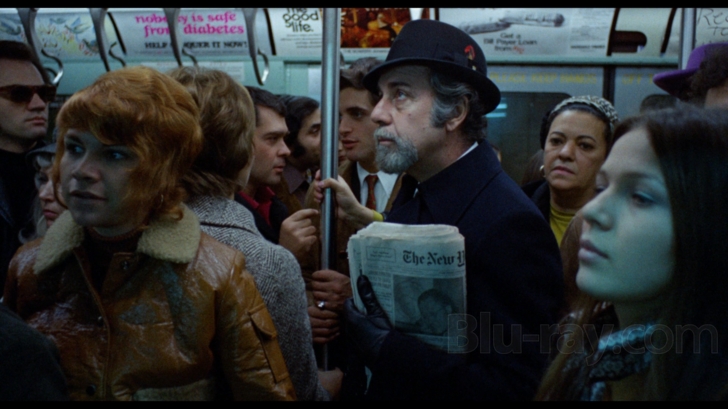
20th Century Fox unravels The French Connection on Blu-ray with both the film's monaural soundtrack as well as a lossless DTS-HD MA 5.1 mix. The lossless mix offers a bit of improvement over the mono track, creating a wider sound field and lending more precision to the music and effects, but it's not head-and-shoulders above the single-channel track, either. The lossless 5.1 mix certainly grabs one's attention form the get-go. It blares through the speakers with alarming presence at reference volume over the opening title sequence. Adjusting the volume a bit downward, the track becomes a mostly enjoyable experience; effects pan nicely around the speakers, primarily up front. Sound effects play with decent authority, particularly gunshots. The film's climactic shootout fills the entire soundstage with the thunderous booms of shotguns and the lesser report of the snub-nosed revolvers. Ambience is also sufficient; the sounds of a noisy club -- the music and the patron chatter -- come through with decent clarity. A subtle hiss accompanies the track. Dialogue seems a bit low in volume compared to the rest of the elements. It's occasionally a strain to hear, and it doesn't match the intensity or volume of other parts of the track. The track features something of a harsh edge and lacks much in the way of fine definition. It definitely fails to encapsulate all the best features of a modern action extravaganza soundtrack, but it's certainly sufficient for what it is.
The French Connection Blu-ray Movie, Special Features and Extras 
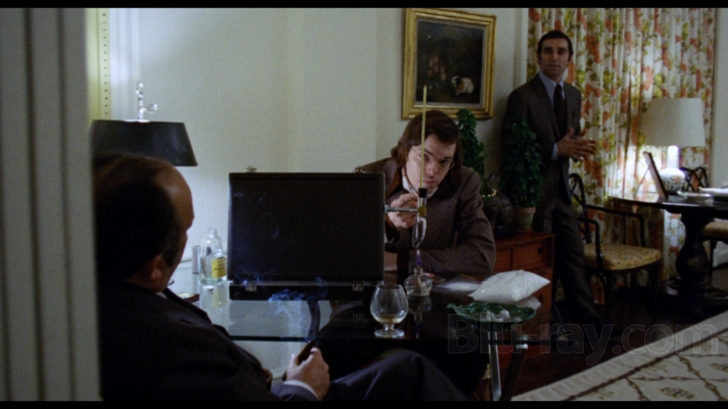
This new Blu-ray release of The French Connection, unlike its two-disc predecessor, arrives as only a single-disc release. Most of the
supplements remain, but gone is D-Box functionality, William Friedkin Introduction to 'The French Connection,' Color Timing 'The French
Connection,' and BBC Documentary: The Poughkeepsie
Shuffle. Note slight discrepancies in supplement runtime, and a slight discrepancy in feature runtime; the old version runs 1:43:42, the new
1:43:53. This new release does contain an all-new
glossy color/black-and-white 25-page booklet highlighting the film and the lives and careers of William Friedkin, Gene Hackman, Roy Scheider, and
Fernando Rey.
- Audio Commentary: Director William Friedkin eloquently shares his thoughts on the filmmaking process. He discusses the real-life heroes and villains of the story on which the film is based, the strengths of the cast, and offers some intriguing background on the case and characters seen in the film. Friedkin does a fantastic job of both recounting the action on-screen but also expanding on the superficialities of the film by delving deeper into various aspects of the filmmaking process.
- Audio Commentary: Gene Hackman speaks first and Roy Scheider second, with the former delivering an intriguing monologue as he recalls landing the role, researching the part, and stories from the set. Later, Scheider recounts many stories of a similar nature. His commentary begins at the beginning of chapter 18.
- Trivia Track.
- Isolated Score Track: Dolby Digital 5.1
- Deleted Scenes (1080p, 12:12): William Friedkin Discusses the Deleted Scenes, Tailing the Frog, The Whip Girl, Devereaux at Work, Mutchie's Bar and Mutchie's Bar Part 2, Girl on a Bicycle, Street Walker, and Hector. In his open, Friendkin offers a fascinating discussion of the organic nature of pictures and the process of editing. The deleted scenes are also available with optional Friedkin commentary.
- Anatomy of a Chase (1080p, 20:23): A supplement which once again features the director, this time on-location of the film's famed chase sequence, discussing the reasoning behind choosing the locations and walking through the sequence. The piece also features an extensive dialogue between Friedkin and Producer Philip D'Antoni as they move along the trail of the chase.
- Hackman on Doyle (1080p, 10:52): Hackman recalls his famed role and the process of making the film.
- Friedkin and Grosso Remember the Real French Connection (1080p, 19:16): A nice piece featuring the director and Sonny Grosso, the real-life officer involved in the case, recalling the events of the case that inspired the film.
- Scene of the Crime (1080p, 5:17): Friedkin and actor (and then-real-life police officer) Randy Jurgensen recall the making of one of the film's most crucial sequences.
- Cop Jazz: The Music of Don Ellis (1080p, 10:07): This supplement highlights the composer and the story behind the film's score.
- Rogue Cop: The Noir Connection (1080p, 13:50): This extra looks at the Film Noir elements of The French Connection and its revitalization of the art form.
- Making the Connection: The Untold Stories of The French Connection (480p, 56:35): A Fox Movie Channel piece that examines the involvement of Officer Sonny Grosso on both the film and the real-world case.
The French Connection Blu-ray Movie, Overall Score and Recommendation 
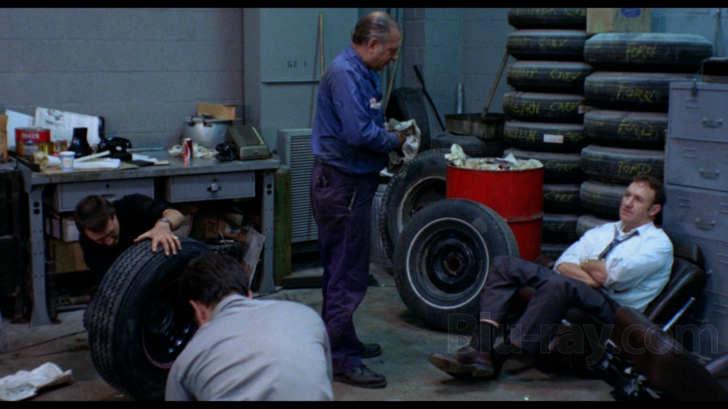
The French Connection is classic and multi-award winning cinema, garnering the Oscar wins as noted above, as well as earning wins for Best Writing, Screenplay Based on Material from Another Medium; Best Film Editing; and Best Picture. It's a precise and deliberate picture that is far from glamorous; instead, the film enjoys a gritty, in-your-face look and feel that conveys every theme of the film nicely, including the seedy underbelly of civilization, the monotony of police work, and the dangers of the chase. Yet the real story of The French Connection on Blu-ray isn't about the movie -- even if the movie should come first in all cases -- but rather the way the movie looks. There are now two director "supervised" or "approved" transfers out there, one in which Director William Friedkin goes to great lengths to champion, and this one, one that Friedkin previously dismissed in favor of the end product found on the older release yet that is now apparently "true to [his] vision." Add that Cinematographer Owen Roizman apparently also approved of this transfer, and the situation seems only more confused. What a headache, but what fun to compare them! The easy solution is to watch both, to own both. If nothing else, it makes for a fun and educational examination of the way something like color timing -- something modern audiences either take for granted or know nothing about -- can drastically alter the tone of a movie, not to mention the physical properties of the end result appearing on TV and projector screens. This new release from Fox contains the same lossless soundtrack and retains most of the supplements, excising, of course, those two extras touting the "other" version of the transfer as well as D-Box functionality and a lengthy documentary. This release comes recommended, even if there's still the mystery of Friedkin's ultimate preference to be sorted out, but considering it comes down to a blurb on the back of this box versus his convincing passion for the old transfer -- and that that older style does work rather well for the film in question -- the easy answer is to own both, enjoy both, and consider the differences each brings to the table.
Other editions
The French Connection: Other Editions
Similar titles
Similar titles you might also like

French Connection II
1975

The Getaway
1972

A Most Violent Year
2014

Magnum Force
The Dirty Harry Collection
1973

Badge 373
1973

Blood Ties
2013

Get Carter
1971

Killer's Kiss 4K
1955

Taxi Driver
1976

The Gauntlet
Reissue
1977

The Driver
Limited Edition to 3000 - SOLD OUT
1978

The Warriors 4K
Standard Edition
1979

Blackhat 4K
Limited Edition
2015

Bullitt
1968

The Stone Killer
Limited Edition to 3000
1973

King of New York
1990

Carlito's Way 4K
1993

Child of God
2013

Vanishing Point
1971

Black Rain
1989

